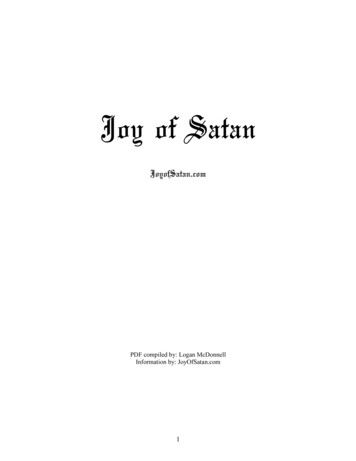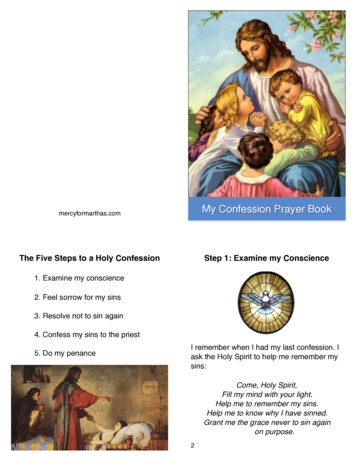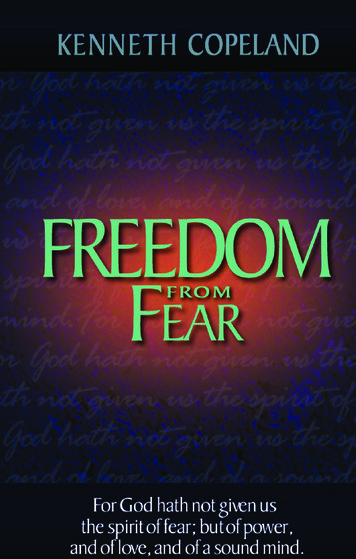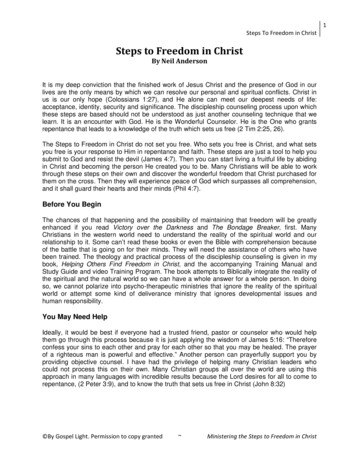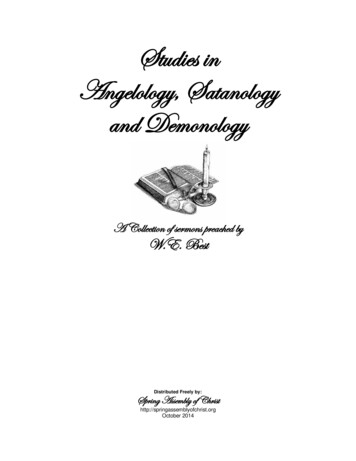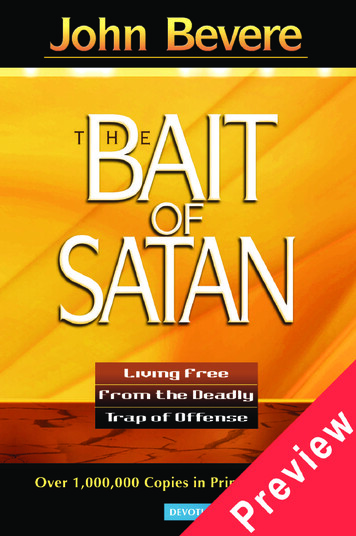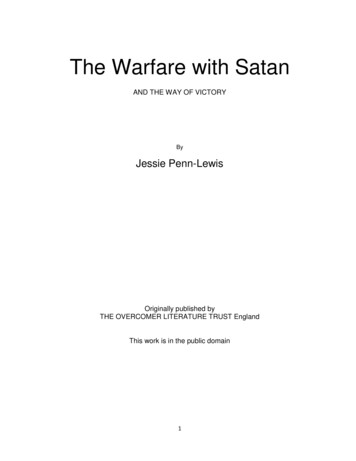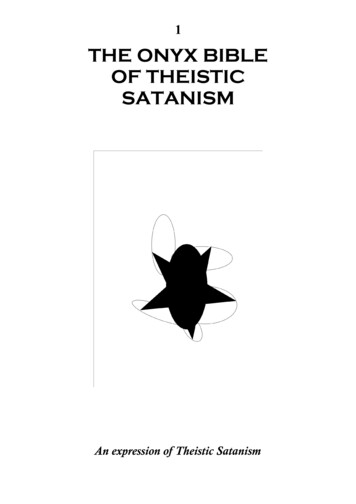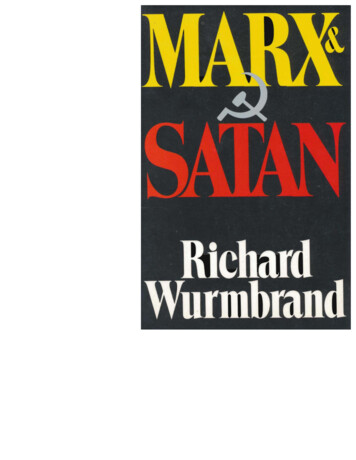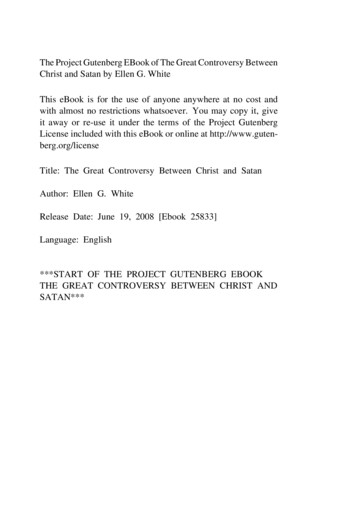
Transcription
The Project Gutenberg EBook of The Great Controversy BetweenChrist and Satan by Ellen G. WhiteThis eBook is for the use of anyone anywhere at no cost andwith almost no restrictions whatsoever. You may copy it, giveit away or re-use it under the terms of the Project GutenbergLicense included with this eBook or online at http://www.gutenberg.org/licenseTitle: The Great Controversy Between Christ and SatanAuthor: Ellen G. WhiteRelease Date: June 19, 2008 [Ebook 25833]Language: English***START OF THE PROJECT GUTENBERG EBOOKTHE GREAT CONTROVERSY BETWEEN CHRIST ANDSATAN***
The Great ControversyBetween Christ and SatanThe Conflict of the Ages in the ChristianDispensationBy Ellen G. WhiteReview & Herald Publishing AssociationWashington, D.C.Copyright 1888, 1907, 1911, by Mrs. E. G. White
ContentsPreface . . . . . . . . . . . . . . . . . . . .Introduction. . . . . . . . . . . . . . . . . .1. The Destruction Of Jerusalem. . . . . . .2. Persecution In The First Centuries. . . . .3. The Apostasy. . . . . . . . . . . . . . .4. The Waldenses. . . . . . . . . . . . . . .5. John Wycliffe. . . . . . . . . . . . . . .6. Huss and Jerome. . . . . . . . . . . . . .7. Luther's Separation From Rome. . . . . .8. Luther Before The Diet. . . . . . . . . .9. The Swiss Reformer. . . . . . . . . . . .10. Progress Of Reform In Germany. . . . .11. Protest Of The Princes. . . . . . . . . .12. The French Reformation. . . . . . . . .13. The Netherlands And Scandinavia. . . .14. Later English Reformers. . . . . . . . .15. The Bible And The French Revolution. .16. The Pilgrim Fathers. . . . . . . . . . .17. Heralds Of The Morning. . . . . . . . .18. An American Reformer. . . . . . . . . .19. Light Through Darkness. . . . . . . . .20. A Great Religious Awakening. . . . . .21. A Warning Rejected. . . . . . . . . . .22. Prophecies Fulfilled. . . . . . . . . . .23. What Is The Sanctuary? . . . . . . . . .24. In The Holy Of Holies. . . . . . . . . .25. God's Law Immutable. . . . . . . . . .26. A Work Of Reform. . . . . . . . . . . .27. Modern Revivals. . . . . . . . . . . . 8355368388405424439448467477
ivThe Great Controversy Between Christ and Satan28. The Investigative Judgment. . . .29. The Origin Of Evil. . . . . . . . .30. Enmity Between Man And Satan. .31. Agency Of Evil Spirits. . . . . . .32. Snares Of Satan. . . . . . . . . . .33. The First Great Deception. . . . .34. Spiritualism. . . . . . . . . . . . .35. Aims Of The Papacy. . . . . . . .36. The Impending Conflict. . . . . .37. The Scriptures A Safeguard. . . .38. The Final Warning. . . . . . . . .39. “The Time Of Trouble.” . . . . .40. God's People Delivered. . . . . . .41. Desolation Of The Earth. . . . . .42. The Controversy Ended. . . . . .Appendix. . . . . . . . . . . . . . . .Index of Scripture References. . . . .General Index. . . . . . . . . . . . . .Footnotes . . . . . . . . . . . . . . 20744829
[iii]
PrefaceThis book, reader, is not published to tell us that there is sinand woe and misery in this world. We know it all too well.This book is not published to tell us that there is an irreconcilable controversy between darkness and light, sin andrighteousness, wrong and right, death and life. In our heart ofhearts we know it, and know that we are participators, actors, inthe conflict.But to every one of us comes at times a longing to know moreof the great controversy. How did the controversy begin? or wasit always here? What elements enter into its awfully complexaspect? How am I related to it? What is my responsibility? I findmyself in this world by no choice of my own. Does that mean tome evil or good?What are the great principles involved? How long will thecontroversy continue? What will be its ending? Will this earthsink, as some scientists tell us, into the depths of a sunless,frozen, eternal night? or is there a better future before it, radiantwith the light of life, warm with the eternal love of God?The question comes closer still: How may the controversyin my own heart, the strife between inflowing selfishness andoutgoing love, be settled in the victory of good, and settled
4[iv]The Great Controversy Between Christ and Satanforever? What does the Bible say? What has God to teach usupon this question, eternally important to every soul?Questions like these meet us from every side. They rise insistent up from the depths of our own heart. They demand definiteanswer.Surely the God who created in us the longing for the better,the desire for the truth, will not withhold from us the answer toall needed knowledge; for “the Lord Jehovah will do nothing,except He reveal His secret unto His servants the prophets.”It is the aim of this book, reader, to help the troubled soul toa right solution of all these problems. It is written by one whohas tasted and found that God is good, and who has learned incommunion with God and the study of His word that the secretof the Lord is with them that fear Him, and that He will showthem His covenant.That we may better understand the principles of the all-important controversy, in which the life of a universe is involved, theauthor has set it before us in great, concrete object-lessons of thelast twenty centuries.The book opens with the sad closing scenes of Jerusalem'shistory, the city of God's chosen, after her rejection of the Manof Calvary, who came to save. Thence onward along the greathighway of the nations, it points us to the persecutions of God'schildren in the first centuries; the great apostasy which followedin His church; the world-awakening of the Reformation, in whichsome of the great principles of the controversy are clearly manifest; the awful lesson of the rejection of right principles byFrance; the revival and exaltation of the Scriptures, and theirbeneficent, life-saving influence; the religious awakening of thelast days; the unsealing of the radiant fountain of God's word,with its wonderful revelations of light and knowledge to meetthe baleful upspringing of every delusion of darkness.The present impending conflict, with the vital principles involved, in which no one can be neutral, are simply, lucidly,
Introduction.5strongly set forth.Last of all, we are told of the eternal and glorious victory ofgood over evil, right over wrong, light over darkness, joy oversorrow, hope over despair, glory over shame, life over death, andeverlasting, long-suffering love over vindictive hate.Former editions of this book have brought many souls to theTrue Shepherd; it is the prayer of the publishers that this editionmay be even more fruitful of eternal good.THE PUBLISHERS.[v]Introduction.Before the entrance of sin, Adam enjoyed open communionwith his Maker; but since man separated himself from God bytransgression, the human race has been cut off from this highprivilege. By the plan of redemption, however, a way hasbeen opened whereby the inhabitants of the earth may still have
6[vi]The Great Controversy Between Christ and Satanconnection with heaven. God has communicated with men byHis Spirit, and divine light has been imparted to the world byrevelations to His chosen servants. “Holy men of God spake asthey were moved by the Holy Ghost.” 2 Peter 1:21.During the first twenty-five hundred years of human history,there was no written revelation. Those who had been taughtof God, communicated their knowledge to others, and it washanded down from father to son, through successive generations.The preparation of the written word began in the time of Moses.Inspired revelations were then embodied in an inspired book.This work continued during the long period of sixteen hundredyears,—from Moses, the historian of creation and the law, toJohn, the recorder of the most sublime truths of the gospel.The Bible points to God as its author; yet it was written byhuman hands; and in the varied style of its different books itpresents the characteristics of the several writers. The truthsrevealed are all “given by inspiration of God” (2 Tim. 3:16); yetthey are expressed in the words of men. The Infinite One byHis Holy Spirit has shed light into the minds and hearts of Hisservants. He has given dreams and visions, symbols and figures;and those to whom the truth was thus revealed, have themselvesembodied the thought in human language.The ten commandments were spoken by God Himself, andwere written by His own hand. They are of divine, and not ofhuman composition. But the Bible, with its God-given truthsexpressed in the language of men, presents a union of the divineand the human. Such a union existed in the nature of Christ, whowas the Son of God and the Son of man. Thus it is true of theBible, as it was of Christ, that “the Word was made flesh, anddwelt among us.” John 1:14.Written in different ages, by men who differed widely inrank and occupation, and in mental and spiritual endowments,the books of the Bible present a wide contrast in style, as wellas a diversity in the nature of the subjects unfolded. Different
Introduction.7forms of expression are employed by different writers; often thesame truth is more strikingly presented by one than by another.And as several writers present a subject under varied aspectsand relations, there may appear, to the superficial, careless, orprejudiced reader, to be discrepancy or contradiction, where thethoughtful, reverent student, with clearer insight, discerns theunderlying harmony.As presented through different individuals, the truth is broughtout in its varied aspects. One writer is more strongly impressedwith one phase of the subject; he grasps those points that harmonize with his experience or with his power of perception andappreciation; another seizes upon a different phase; and each,under the guidance of the Holy Spirit, presents what is mostforcibly impressed upon his own mind—a different aspect of thetruth in each, but a perfect harmony through all. And the truthsthus revealed unite to form a perfect whole, adapted to meet thewants of men in all the circumstances and experiences of life.God has been pleased to communicate His truth to the worldby human agencies, and He Himself, by His Holy Spirit, qualifiedmen and enabled them to do this work. He guided the mind in theselection of what to speak and what to write. The treasure wasintrusted to earthen vessels, yet it is, none the less, from Heaven.The testimony is conveyed through the imperfect expression ofhuman language, yet it is the testimony of God; and the obedient,believing child of God beholds in it the glory of a divine power,full of grace and truth.In His word, God has committed to men the knowledge necessary for salvation. The Holy Scriptures are to be accepted asan authoritative, infallible revelation of His will. They are thestandard of character, the revealer of doctrines, and the test ofexperience. “Every scripture inspired of God is also profitable forteaching, for reproof, for correction, for instruction which is inrighteousness; that the man of God may be complete, furnishedcompletely unto every good work.” 2 Tim. 3:16, 17, Revised[vii]
8[viii]The Great Controversy Between Christ and SatanVersion.Yet the fact that God has revealed His will to men throughHis word, has not rendered needless the continued presence andguiding of the Holy Spirit. On the contrary, the Spirit waspromised by our Saviour, to open the Word to His servants, toilluminate and apply its teachings. And since it was the Spirit ofGod that inspired the Bible, it is impossible that the teaching ofthe Spirit should ever be contrary to that of the Word.The Spirit was not given—nor can it ever be bestowed—tosupersede the Bible; for the Scriptures explicitly state that theword of God is the standard by which all teaching and experiencemust be tested. Says the apostle John, “Believe not every spirit,but try the spirits whether they are of God: because many falseprophets are gone out into the world.” 1 John 4:1. And Isaiahdeclares, “To the law and to the testimony: if they speak notaccording to this word, it is because there is no light in them.”Isa. 8:20.Great reproach has been cast upon the work of the Holy Spiritby the errors of a class that, claiming its enlightenment, professto have no further need of guidance from the word of God. Theyare governed by impressions which they regard as the voice ofGod in the soul. But the spirit that controls them is not theSpirit of God. This following of impressions, to the neglect ofthe Scriptures, can lead only to confusion, to deception and ruin.It serves only to further the designs of the evil one. Since theministry of the Holy Spirit is of vital importance to the churchof Christ, it is one of the devices of Satan, through the errorsof extremists and fanatics, to cast contempt upon the work ofthe Spirit, and cause the people of God to neglect this source ofstrength which our Lord Himself has provided.In harmony with the word of God, His Spirit was to continueits work throughout the period of the gospel dispensation. During the ages while the Scriptures of both the Old and the NewTestament were being given, the Holy Spirit did not cease to
Introduction.9communicate light to individual minds, apart from the revelationsto be embodied in the Sacred Canon. The Bible itself relates how,through the Holy Spirit, men received warning, reproof, counsel,and instruction, in matters in no way relating to the giving of theScriptures. And mention is made of prophets in different ages,of whose utterances nothing is recorded. In like manner, afterthe close of the canon of Scripture, the Holy Spirit was still tocontinue its work, to enlighten, warn, and comfort the childrenof God.Jesus promised His disciples, “The Comforter, which is theHoly Ghost, whom the Father will send in My name, He shallteach you all things, and bring all things to your remembrance,whatsoever I have said unto you.” “When He, the Spirit of truth,is come, He will guide you into all truth: . and He will show youthings to come.” John 14:26; 16:13. Scripture plainly teachesthat these promises, so far from being limited to apostolic days,extend to the church of Christ in all ages. The Saviour assures Hisfollowers, “I am with you alway, even unto the end of the world.”Matt. 28:20. And Paul declares that the gifts and manifestationsof the Spirit were set in the church “for the perfecting of thesaints, for the work of the ministry, for the edifying of the bodyof Christ: till we all come in the unity of the faith, and of theknowledge of the Son of God, unto a perfect man, unto themeasure of the stature of the fulness of Christ.” Eph. 4:12, 13.For the believers at Ephesus the apostle prayed, “That theGod of our Lord Jesus Christ, the Father of glory, may giveunto you the Spirit of wisdom and revelation in the knowledgeof Him: the eyes of your understanding being enlightened; thatye may know what is the hope of His calling, and . what isthe exceeding greatness of His power to us-ward who believe.”Eph. 1:17-19. The ministry of the divine Spirit in enlighteningthe understanding and opening to the mind the deep things ofGod's holy word, was the blessing which Paul thus besought forthe Ephesian church.[ix]
10[x]The Great Controversy Between Christ and SatanAfter the wonderful manifestation of the Holy Spirit on theday of Pentecost, Peter exhorted the people to repentance andbaptism in the name of Christ, for the remission of their sins;and he said: “Ye shall receive the gift of the Holy Ghost. For thepromise is unto you, and to your children, and to all that are afaroff, even as many as the Lord our God shall call.” Acts 2:38, 39.In immediate connection with the scenes of the great day ofGod, the Lord by the prophet Joel has promised a special manifestation of His Spirit. Joel 2:28. This prophecy received a partialfulfilment in the outpouring of the Spirit on the day of Pentecost;but it will reach its full accomplishment in the manifestation ofdivine grace which will attend the closing work of the gospel.The great controversy between good and evil will increase inintensity to the very close of time. In all ages the wrath of Satanhas been manifested against the church of Christ; and God hasbestowed His grace and Spirit upon His people to strengthenthem to stand against the power of the evil one. When theapostles of Christ were to bear His gospel to the world and torecord it for all future ages, they were especially endowed withthe enlightenment of the Spirit. But as the church approaches herfinal deliverance, Satan is to work with greater power. He comesdown “having great wrath, because he knoweth that he hath buta short time.” Rev. 12:12. He will work “with all power andsigns and lying wonders.” 2 Thess. 2:9. For six thousand yearsthat master-mind that once was highest among the angels of God,has been wholly bent to the work of deception and ruin. And allthe depths of satanic skill and subtlety acquired, all the crueltydeveloped, during these struggles of the ages, will be brought tobear against God's people in the final conflict. And in this time ofperil the followers of Christ are to bear to the world the warningof the Lord's second advent; and a people are to be prepared tostand before Him at His coming, “without spot, and blameless.”2 Peter 3:14. At this time the special endowment of divine graceand power is not less needful to the church than in apostolic days.
Introduction.11Through the illumination of the Holy Spirit, the scenes ofthe long-continued conflict between good and evil have beenopened to the writer of these pages. From time to time I havebeen permitted to behold the working, in different ages, of thegreat controversy between Christ, the Prince of life, the Authorof our salvation, and Satan, the prince of evil, the author ofsin, the first transgressor of God's holy law. Satan's enmityagainst Christ has been manifested against His followers. Thesame hatred of the principles of God's law, the same policy ofdeception, by which error is made to appear as truth, by whichhuman laws are substituted for the law of God, and men are ledto worship the creature rather than the Creator, may be tracedin all the history of the past. Satan's efforts to misrepresent thecharacter of God, to cause men to cherish a false conception ofthe Creator, and thus to regard Him with fear and hate rather thanwith love; his endeavors to set aside the divine law, leading thepeople to think themselves free from its requirements; and hispersecution of those who dare to resist his deceptions, have beensteadfastly pursued in all ages. They may be traced in the historyof patriarchs, prophets, and apostles, of martyrs and reformers.In the great final conflict, Satan will employ the same policy,manifest the same spirit, and work for the same end, as in allpreceding ages. That which has been, will be, except that thecoming struggle will be marked with a terrible intensity suchas the world has never witnessed. Satan's deceptions will bemore subtle, his assaults more determined. If it were possible, hewould lead astray the elect. Mark 13:22, Revised Version.As the Spirit of God has opened to my mind the great truthsof His word, and the scenes of the past and the future, I havebeen bidden to make known to others that which has thus beenrevealed,—to trace the history of the controversy in past ages,and especially so to present it as to shed a light on the fast-approaching struggle of the future. In pursuance of this purpose,I have endeavored to select and group together events in the[xi]
12[xii]The Great Controversy Between Christ and Satanhistory of the church in such a manner as to trace the unfolding ofthe great testing truths that at different periods have been givento the world, that have excited the wrath of Satan, and the enmityof a world-loving church, and that have been maintained by thewitness of those who “loved not their lives unto the death.”In these records we may see a foreshadowing of the conflictbefore us. Regarding them in the light of God's word, and bythe illumination of His Spirit, we may see unveiled the devicesof the wicked one, and the dangers which they must shun whowould be found “without fault” before the Lord at His coming.The great events which have marked the progress of reformin past ages, are matters of history, well known and universallyacknowledged by the Protestant world; they are facts which nonecan gainsay. This history I have presented briefly, in accordance with the scope of the book, and the brevity which mustnecessarily be observed, the facts having been condensed intoas little space as seemed consistent with a proper understandingof their application. In some cases where a historian has sogrouped together events as to afford, in brief, a comprehensiveview of the subject, or has summarized details in a convenientmanner, his words have been quoted; but in some instances nospecific credit has been given, since the quotations are not givenfor the purpose of citing that writer as authority, but because hisstatement affords a ready and forcible presentation of the subject.In narrating the experience and views of those carrying forwardthe work of reform in our own time, similar use has been madeof their published works.It is not so much the object of this book to present new truthsconcerning the struggles of former times, as to bring out facts andprinciples which have a bearing on coming events. Yet viewed asa part of the controversy between the forces of light and darkness,all these records of the past are seen to have a new significance;and through them a light is cast upon the future, illumining thepathway of those who, like the reformers of past ages, will be
1. The Destruction Of Jerusalem.13called, even at the peril of all earthly good, to witness “for theword of God, and for the testimony of Jesus Christ.”To unfold the scenes of the great controversy between truthand error; to reveal the wiles of Satan, and the means by whichhe may be successfully resisted; to present a satisfactory solutionof the great problem of evil, shedding such a light upon theorigin and the final disposition of sin as to make fully manifestthe justice and benevolence of God in all His dealings with Hiscreatures; and to show the holy, unchanging nature of His law, isthe object of this book. That through its influence souls may bedelivered from the power of darkness, and become “partakers ofthe inheritance of the saints in light,” to the praise of Him wholoved us, and gave Himself for us, is the earnest prayer of thewriter.E. G. W.Jerusalem From The Mount Of Olives.[017]
14The Great Controversy Between Christ and Satan1. The Destruction Of Jerusalem.“If thou hadst known, even thou, at least in this thy day, thethings which belong unto thy peace! but now they are hid fromthine eyes. For the days shall come upon thee, that thine enemiesshall cast a trench about thee, and compass thee round, and keepthee in on every side, and shall lay thee even with the ground,and thy children within thee; and they shall not leave in thee onestone upon another; because thou knewest not the time of thyvisitation.”1From the crest of Olivet, Jesus looked upon Jerusalem. Fairand peaceful was the scene spread out before Him. It was theseason of the Passover, and from all lands the children of Jacobhad gathered there to celebrate the great national festival. Inthe midst of gardens and vineyards, and green slopes studdedwith pilgrims' tents, rose the terraced hills, the stately palaces,and massive bulwarks of Israel's capital. The daughter of Zionseemed in her pride to say, “I sit a queen, and shall see no sorrow;” as lovely then, and deeming herself as secure in Heaven's1Luke 19:42-44.
1. The Destruction Of Jerusalem.15favor, as when, ages before, the royal minstrel sung, “Beautifulfor situation, the joy of the whole earth, is Mount Zion, . the cityof the great King.”2 In full view were the magnificent buildingsof the temple. The rays of the setting sun lighted up the snowywhiteness of its marble walls, and gleamed from golden gateand tower and pinnacle. “The perfection of beauty” it stood,the pride of the Jewish nation. What child of Israel could gazeupon the scene without a thrill of joy and admiration! But farother thoughts occupied the mind of Jesus. “When He wascome near, He beheld the city, and wept over it.”3 Amid theuniversal rejoicing of the triumphal entry, while palm brancheswaved, while glad hosannas awoke the echoes of the hills, andthousands of voices declared Him king, the world's Redeemerwas overwhelmed with a sudden and mysterious sorrow. He,the Son of God, the Promised One of Israel, whose power hadconquered death, and called its captives from the grave, was intears, not of ordinary grief, but of intense, irrepressible agony.His tears were not for Himself, though He well knew whitherHis feet were tending. Before Him lay Gethsemane, the sceneof His approaching agony. The sheep gate also was in sight,through which for centuries the victims for sacrifice had beenled, and which was to open for Him when He should be “broughtas a lamb to the slaughter.”4 Not far distant was Calvary, theplace of crucifixion. Upon the path which Christ was soon totread must fall the horror of great darkness as He should makeHis soul an offering for sin. Yet it was not the contemplationof these scenes that cast the shadow upon Him in this hourof gladness. No foreboding of His own superhuman anguishclouded that unselfish spirit. He wept for the doomed thousandsof Jerusalem—because of the blindness and impenitence of thosewhom He came to bless and to save.234Ps. 48:2.Luke 19:41.Isa. 53:7.[018]
16[019]The Great Controversy Between Christ and SatanThe history of more than a thousand years of God's specialfavor and guardian care, manifested to the chosen people, wasopen to the eye of Jesus. There was Mount Moriah, where theson of promise, an unresisting victim, had been bound to thealtar,—emblem of the offering of the Son of God.5 There, thecovenant of blessing, the glorious Messianic promise, had beenconfirmed to the father of the faithful. There, the flames of thesacrifice ascending to heaven from the threshing-floor of Ornanhad turned aside the sword of the destroying angel6 —fittingsymbol of the Saviour's sacrifice and mediation for guilty men.Jerusalem had been honored of God above all the earth. TheLord had “chosen Zion,” He had “desired it for His habitation.”7There, for ages, holy prophets had uttered their messages ofwarning. There, priests had waved their censers, and the cloud ofincense, with the prayers of the worshipers, had ascended beforeGod. There, daily the blood of slain lambs had been offered,pointing forward to the Lamb of God. There, Jehovah had revealed His presence in the cloud of glory above the mercy-seat.There, rested the base of that mystic ladder connecting earthwith heaven,8 —that ladder upon which angels of God descendedand ascended, and which opened to the world the way into theholiest of all. Had Israel as a nation preserved her allegiance toHeaven, Jerusalem would have stood forever, the elect of God.9But the history of that favored people was a record of backslidingand rebellion. They had resisted Heaven's grace, abused theirprivileges, and slighted their opportunities.Although Israel had “mocked the messengers of God, anddespised His words, and misused His prophets,”10 He had still5678910Gen. 22:9, 16-18.1 Chronicles 21.Ps. 132:13.Gen. 28:12; John 1:51.Jer. 17:21-25.2 Chron. 36:16, 15.
1. The Destruction Of Jerusalem.17manifested Himself to them, as “the Lord God, merciful andgracious, long-suffering, and abundant in goodness and truth;”11notwithstanding repeated rejections, His mercy had continued itspleadings. With more than a father's pitying love for the son ofhis care, God had “sent to them by His messengers, rising upbetimes, and sending; because He had compassion on His people,and on His dwelling-place.”12 When remonstrance, entreaty, andrebuke had failed, He sent to them the best gift of heaven; nay,He poured out all heaven in that one Gift.The Son of God Himself was sent to plead with the impenitentcity. It was Christ that had brought Israel as a goodly vine out ofEgypt.13 His own hand had cast out the heathen before it. Hehad planted it “in a very fruitful hill.”14 His guardian care hadhedged it about. His servants had been sent to nurture it. “Whatcould have been done more to My vineyard,” He exclaims, “thatI have not done in it?”15 Though when He “looked that it shouldbring forth grapes, it brought forth wild grapes,”16 yet with a stillyearning hope of fruitfulness He came in person to His vineyard,if haply it might be saved from destruction. He digged aboutHis vine; He pruned and cherished it. He was unwearied in Hisefforts to save this vine of His own planting.For three years the Lord of light and glory had gone in and outamong His people. He “went about doing good, and healing allthat were oppressed of the devil,”17 binding up the broken-hearted, setting at liberty them that were bound, restoring sight to theblind, causing the lame to walk and the deaf to hear, cleansingthe lepers, raising the dead, and preaching the gospel to the poor.To all classes alike was addressed the gracious call, “Come unto11121314151617Ex. 34:6.Ibid.Ps. 80:8.Isa. 5:1-4.Ibid.Ibid.Acts 10:38; Luke 4:18; Matt. 11:5.[020]
18[021]The Great Controversy Between Christ and SatanMe, all ye that labor and are heavy laden, and I
Jun 19, 2008 · Christ and Satan by Ellen G. White This eBook is for the use of anyone anywhere at no cost and with almost no restrictions whatsoever. You may copy it, give . the books of the Bible present a wide con
